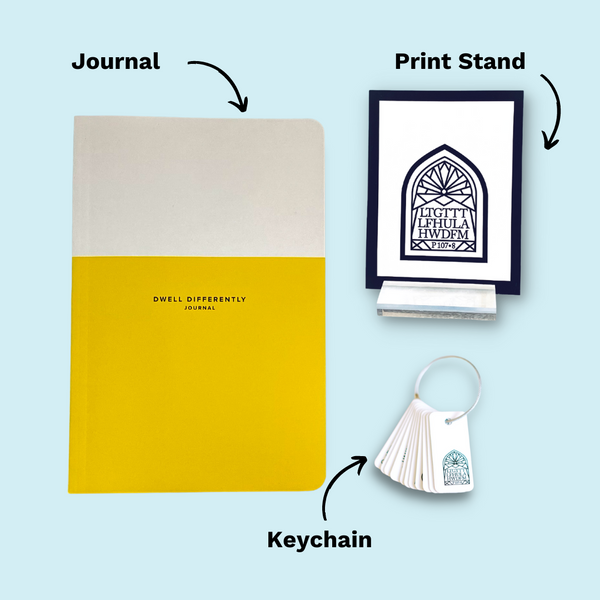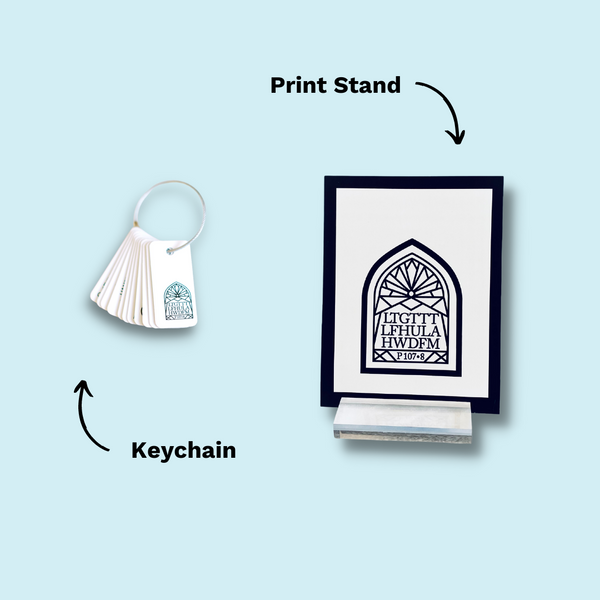"You will keep in perfect peace those whose minds are steadfast, because they trust in you.” — Isaiah 26:3
I have teenagers…lots of teenagers. Four to be exact (plus one pre-teen), and right now they're all living in my house. And it is messy—messy kitchen, messy bedrooms, messy laundry. But more than the mess on the floors and counters is the mess of helping these burgeoning young people become adults. It’s a start-stop, try-fail-try-again, messy process as they learn to drive, figure out finances, discover dating, work first jobs, and gradually take on more and more responsibilities. And all the while, I’m start-stop, try-fail-try-again learning to parent them as I let go of more and more authority. And that is honestly the messiest part. Let me restate that more clearly:
I am the messiest part.
I’m the one fretting while they excitedly drive off for each new adventure. And as much as I say I believe my kids belong to God and that he is good, I find myself regularly doubting his goodness, bargaining for security, and trying to control the only One who controls all things. Because of all that, I’m almost daily on my knees, not just praying for my kids, but asking God to forgive me, to help me trust him, and to give me peace in the mess, especially the mess of me. But here’s the good news:
God longs to give us peace and to rescue us out of our mess.
It’s what we’ll be discovering in our memory verse all month. God knows all our mess, and he is not only prepared to rescue us, but he gives us peace and helps us trust him in the process. Listen to the promise in our verse, “You will keep in perfect peace those whose minds are steadfast, because they trust in you” (Isaiah 26:3). It’s a promise God made to his messy people way back when, and it is a promise that’s still good for us today.
We’re going to do a quick fly-over of the mess and discover the judgment we deserve and the peace God promises instead to anyone who trusts in him. And as always, if you want to hear me discuss the fuller picture, you're welcome to listen in on this week’s teaching episode of The Dwell Differently Podcast. I can assure you there’s a whole lot more going on than what I can address in this short article!
The Mess
We serve a God who isn’t afraid of our mess (WHEW!). In fact, he’s the kind of God who is bent on cleaning it up for us and saving us right out of it. Our verse is situated in the middle of Isaiah in the middle of one of the biggest messes God’s people ever made in the Bible. They’ve blatantly disobeyed God and worshiped other non-gods for whole centuries. And God has warned them again and again to repent and return to him, but they have not. So the prophet Isaiah brings God’s final message of his impending (dreadful) judgment. Surprisingly though, in the midst of such just judgment, Isaiah also speaks of God’s heart for his people and his ultimate plan to forgive them and bring peace to their relationship. It's a message of brilliant hope for all God’s people, both then and now.
Judgment or Peace?
In Chapters 24-27 of Isaiah (where we find our verse) we get what some scholars call a “mini-apocalypse.” In other words, it’s a picture into God’s good plan to rescue his people out of their mess for all time and also to sweep away the remaining mess. In this picture, Isaiah tells the tale of two cities: the wicked, unrepentant city of the world and the penitent, righteous city called the city of God or Jerusalem. These cities represent the two warring realities of our world and the two possible fates of all mankind.
The City of the World
The city of the world represents all the people, the leaders, the structures, and even the heavenly beings that are against God. This city is the culmination of the wicked cities of the earth such as Babylon or Egypt. In Isaiah 24-27, this city is the personification of any and all who are rampantly and unrepentantly wicked—they defile the earth, treat the poor and needy with contempt, violate every one of God’s laws, and approve when others do the same. And God says for all of these things this city and its inhabitants will face justice and be destroyed. Moreover, Isaiah says the poor and needy are the very ones who will tread over the place where the City of the World once held dominion (Isaiah 26:6).
The City of God
Then there is the reverse city. Where the other city was dark and terrible, God’s city is brilliant and wonderful. It is the redeemed Jerusalem, the fulfillment of God’s original intent for that city: a place where God himself dwells in eternal peace with his people. The citizens of that city sing out to God the words of our verse, “You will keep in perfect peace those whose minds are steadfast, because they trust in you” ( Isaiah 26:3). Their peace is perfect not because they were perfect (they’re mess makers just like us). No, their peace is perfect because they have trusted in the one who makes perfect peace with all who trust in him. They sing to him, “LORD, you establish peace for us; all that we have accomplished you have done for us” (Isaiah 26:12). We know from the New Testament that this peacemaking work was completed in Jesus and is on offer for all who repent of their sins and trust in his saving work on the cross.
What Will We Do with Our Mess?
This is the question we must ask ourselves. Will we accept the promise of peace? Will we trust in God’s saving work on our behalf? Like God’s people in Isaiah’s time, we’re mess makers who need saving out of our mess. Like them, we prioritize and devote ourselves to things that are not God. Like them, we don’t listen to him or apply his wisdom to our practical living. Or, to get personal, I for one say I believe in God, but like I mentioned, I doubt his goodness and try to manipulate him. Whatever it is, we all make a mess of our lives, and we need God to save us out of it and make peace possible with him.
But we can only experience that peace when we trust in him.
Yes, we need to trust him for our salvation, but we also need to trust him with all the other things—with our relationships, with our money, with our future, with our right now—with all of it. None of those things are trustworthy places to find peace, no matter how tightly we hold on to them or protect them. Instead of trusting in those things, we need to entrust ourselves to God. When we do, we will experience restored peace with God, both now and on that promised day when we dwell with him forever in his holy city.




